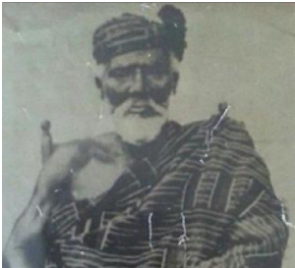Tackie Tawiah I, the Accra king who defied British order to steal the Golden Stool

King Tawiah l was the overlord of the Ga people of Ghana, who reigned during the “Golden years” of Accra (1862-1902) and still acclaimed as the most illustrious, progressive and enterprising of all the Ga kings (Ayittey, 2006).
He was described by Dr. A. Boi Quartey-Papafio as “a fulcrum figure in the modern history of the Ga-Dangme” and a stalwart whose reign saw the establishment of Accra as the capital of Ghana in 1877.
His era saw countless skilled young artisans, including Tetteh Quarshie, who later brought viable cocoa to the Gold Coast after the Dutch and the Swiss. His reign also witnessed the translation of the Bible into Ga in 1865.
Historian and researcher at the University of Ghana, Kweku Darko Ankrah, submits that he was not only development-oriented but also a leader who identified himself with his people, adding that while he fought relentlessly to protect and uphold Ga-Dangme customs and traditions, he was also enlightened and progressive enough to abolish obnoxious customs.
The King was also a warrior and was involved in the Anlo Wars of 1860. For his long reign, he gained the title “Abiasuma”, which means “King Still Reigns.”
King Tackie Tawiah I was born in 1817 into the Ga royal family of Teiko Tsuru We at Kinka. He was named Nii Quarshie Tawiah. His father was Nii Teiko Doku, son of Ga Mantse and prosperous Accra trader, King Teiko Tsuru (1782-1787), and his mother was Naa Ashong Danso from Asere.
She was a woman of great respect and connections, which greatly enhanced her son’s reign. On his paternal side, King Tawiah I traced his royal lineage proudly to King Ayikushi, the founder and the first priest-king (Wulomo-Mantse) of the Gam?i (Ga people). This means that King Tawiah I was from both Teiko Tsuru We and Abola Tunma We. In Ga language, “We” means “family.”

King Tackie Tawiah I via tinkongbee.wordpress.com
After securing his basic education at the Wesley Methodist School, he began life as a businessman, and his knack in the Gold Coast trade and commercial terrain made him a merchant prince, travelling to Tamale, Akropong, and Kumasi to trade and also to Togo, Sierra Leone, Nigeria, and Fernando Po (now Equatorial Guinea) to transact business and make friends with people from the Caribbean and South America, especially Brazil.
He later invited some of his diaspora friends to come and settle in Accra to participate in the town’s progressive transformation through business. Alasha Nelson, an Afro-Brazilian, or what the Ga people called Tabom people was the most distinguished of these change agents. Alasha (Azumah) Nelson later became one of the pillars and the head of sizeable Brazilian community in Accra.
 The people of Accra mourning their deceased King (Mantse), Abiasuma Nii Tackie Tawiah I in Accra in 1903. Photo taken by F. R. C. Lutterodt in Accra, Gold Coast (Ghana) and currently an archival possession of University of Southern California Libraries.
The people of Accra mourning their deceased King (Mantse), Abiasuma Nii Tackie Tawiah I in Accra in 1903. Photo taken by F. R. C. Lutterodt in Accra, Gold Coast (Ghana) and currently an archival possession of University of Southern California Libraries.
On December 12, 1862, Nii Quarshie Tawiah ascended the Ga throne as the 20th King (Mantse) of Accra after succeeding Nii Yaote, who reigned from 1859 to 1862.
Within two years of his ascension as the Ga Mantse, King Tackie Tawiah’s reign witnessed a riot between James Town and the Usher Fort in 1864. This was the time that British ruled Accra ruthlessly, but he led his people to resist the British attempt at introducing Ordinance for the town, exacting taxes and land acquisition. When the three earthquakes hit Accra during the period, he mobilized the Ga people to stand its ravages and moved on with their lives. He also got involved in the Anlo Wars (1855-1866), when the people of Accra joined forces with the Akwapim to fight the Anlo.
He fought in the Tordzie or Adidome wars. In 1869, he led his Ga warriors to march with the combined forces of the British, Ada, Akyem and Akwapim against the Anlos and their Asante allies in the Vovo, Duffor and Clover Wars.
The king was considered a great military tactician assisted by his two powerful warriors: Asafoatse Oman and Asafoatse Ayi Kodwo Mankattah. The king fought alongside the Governor of Usher, who had the Gold Coast Constabulary in the June 1869 war at Asutuare.
When the Asantes made several incursions to Ada to occupy it with the sole purpose of capturing the Songhor Lagoon to mine salt with the support of their formidable Anlo allies, and war broke out between the Ada people and the Asantes, King Tawiah offered assistance to the Ada people.

King Tackie Tawiah l via Facebook
As the British colonialists continued to exhibit their shameless antics after securing the southern Gold Coast as their Colony, the King and his people remained unimpressed with their attitude. On March 19, 1877, the British colonialists transferred their administrative capital from Cape Coast to Accra. Ayittey (2006) in line with other historians contend that three most important factors for the move were the phenomenal commercial development of Accra, its superior sanitation, and relative stability and security that King Tackie Tawiah I had brought to Accra.
He was an independent thinker who stood on his grounds against threats. When the British made presentations to him to assist them alongside King Asafu-Adjaye of Juaben to invade Asante to claim the Golden Stool he declined. Consequently, Governor Hodgson described him as an “uncooperative King” As a result he was exiled to Elmina from November 1880 to 10 March 1883 due to what the British described as the King’s “persistent disobedience of the order of the British government.”

Chief João Antonio Nelson (in suit) and Gã Mãntse Taki Tawia I (in white beard), c. 1890. Credit: Brazil House Brochure.
After receiving his pardon in 1883, he was taken to Ga Mashie (Accra Central) in a great procession to continue his reign and led his people in their struggles against the colonial regime.
King Tawiah I was always ready to follow the advice of his cabinet, nor could he be influenced by money; his probity was beyond question (Ayittey, 2006). He offered lands to the first Hausa community in Accra and even endorsed Braimah as the leader of the Mohammedan community.
Having reigned for 40 years, Tawiah l died in 1902 and was buried in Accra. He was the second-longest King after Nii Tetteh Ahinakwa, who reigned from 1740 to 1782.
On September 23, 2002, a giant effigy of him was unveiled at the Accra central business district near the Makola Shopping Mall in honour of his great achievements. Tawiah I was first honoured in 1997 when the Kanda Flyover in Accra was named after him. In the same year, the Ga-Dangmes instituted King Tackie Tawiah I Memorial Lectures. He was the second Ghanaian king to be featured on a Ghana stamp after Asantehene.
Source: face2faceafrica.com





